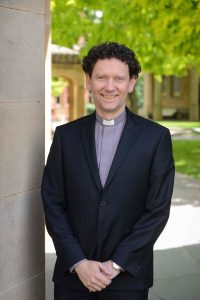 In light of some of the mixed messages coming out of the Anglican Diocese of Sydney and many of its schools recently, it is important to affirm that we are all made in God’s image. This is one of the most important messages Jesus preached. At the centre of our faith, Christians affirm a theology of blessing for all people. At our best, Christians forge a path, which is inclusive, life-giving and life-affirming.
In light of some of the mixed messages coming out of the Anglican Diocese of Sydney and many of its schools recently, it is important to affirm that we are all made in God’s image. This is one of the most important messages Jesus preached. At the centre of our faith, Christians affirm a theology of blessing for all people. At our best, Christians forge a path, which is inclusive, life-giving and life-affirming.
Jesus was a threat to the Roman authorities of his day, because he was a popular leader with a large following, who talked about everyone being equal. That was a huge threat to the Empire, which was built on inequality, beginning with slavery. In addition, Jesus was a threat to the religious leaders of his day, precisely because he preached that everyone was equal under God. If you preach that everyone is equal under God, then no-one can be excluded. But the religious leaders of his day excluded plenty of people, basically anyone who didn’t measure up to their standards of perfection.
Jesus was such a huge threat, that religious leaders in particular would attempt to trap him in what he said. The Pharisees are described as attempting to do so in a number of places in the New Testament, including in Mark chapter 12, verses 13–17. They ask him whether it’s lawful to pay taxes to the emperor or not. Their plan is that if he says, “No” then they can snitch on him to the Roman authorities and potentially have him arrested for inciting a rebellion against the Empire. Governments hate it if you avoid paying tax! But if he says, “Yes, it is lawful to pay taxes to the emperor,” then he would get off-side with the local Jewish people, his fellow inhabitants, because they really resented paying tax to a foreign power. So Jesus is in a no-win situation.
His response is brilliant. “Whose image is on the coin?” he asks and of course it’s the emperor’s. “Then give to the emperor the things that are the emperor’s,” (in other words, pay your taxes, but give “to God the things that are God’s,” (in other words, you are all made in God’s image and belong to God). He follows this up with the command to love your neighbour as yourself (Mark 12: 28–34).
Jesus’ response is ingenious. He avoids the trap about whether it’s right to pay taxes or not. But then he changes the whole discussion, so that it becomes a teaching moment on inclusion and acceptance.
We are all made in God’s image and therefore we are all acceptable to God. If we are all made in God’s image and if we are all acceptable to God, then no-one is excluded. And if no-one is excluded, then the practical result of that is that we must love our neighbours as ourselves.
One challenge I like to give the students occasionally is to get them to ask themselves, How could I be more inclusive of those people, who are often excluded or marginalised in our society? How could I be more inclusive in the language I use and the actions I take? In Chapel this week I showed a number of photographs of different people, who represented various groups in our society, and challenged the students to reflect on whether they had ever excluded such people through their words or deeds.
Being inclusive is a core Gospel value; it’s at the heart of what it means to be a Christian and it’s at the heart of what it means to be a decent person. It is implicit, and sometimes explicit, both in Jesus’ teaching and in his encounters with the religious leaders of his day.
The Reverend Dr Theo McCall
School Chaplain
